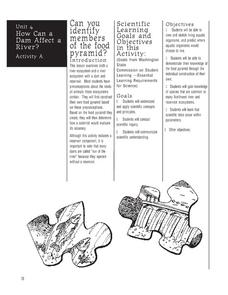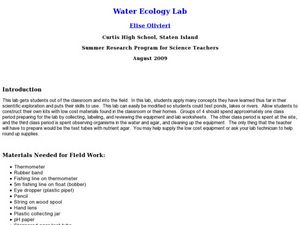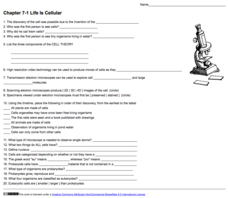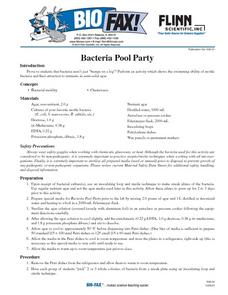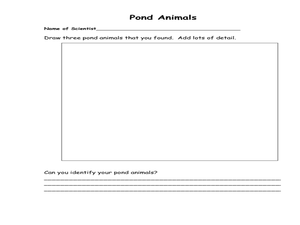Curated OER
Body Organization
Seventh graders explore how the body is organized. They create flashcards of key terms and visit stations to view levels of organization in the human body. They examine themselves and rearrange their flashcards in order of increasing...
Curated OER
Organic Matter in Soils
Students examine soil samples for the presence of organic matter. They determine which soil sample from their area contains the highest amount of organic matter.
Curated OER
Microfishing
Students use a simple method to collect living microorganisms from natural and/or artificial environments and develop skills in microscopy, observation, drawing, speculation, hypothesizing, oral presentation, and raising questions.
Science Friday
Termite Symbiosis
What happens to the wood a termite eats? Pupils learn about the three types of symbiosis with pictures of symbiotic pairs. Afterward, they determine whether there is a symbiotic relationship with a termite by dissecting termites and...
Curated OER
Habitat Assessment
Third graders demonstrate the effects of varying environmental components on plants and animals: chemical, physical and biological characteristics of a habitat. They find chemical, physical and biological characteristics of the lake at...
Curated OER
An Introduction to Microbes - Biology Teaching Thesis
Students are able to define microbes and identify the five main groups of microbes. They are able to give examples of ways in which microbes have impacted or currently impact human life. Students are able to explain that not all microbes...
Foundation for Water & Energy Education
How Can a Dam Affect a River? Activity A
Written for Washington state students in life science, this lesson provides an opportunity to examine the residents of local freshwater habitats. You or the class collects a water sample, and learners try to examine what organisms live...
Curated OER
Water Ecology Lab
Students determine the characteristics of a stream ecosystem and its organisms. In this water ecology lesson students complete several labs that shows them presence of life, water appearance, and water flow.
Curated OER
Science Jeopardy
Wow! Review an entire semester of biology curriculum playing this Science Jeopardy game! The variety of topics is extremely broad, so you will need to review each question to find if they all apply to your course. As you find material...
Curated OER
Exploring Magnification and the Micro-world
Students examine what magnification is and does. In this microscope and magnification lesson, students listen to a reading of Greg's Microscope by Millicent E. Selson which explains what a microscope does. They talk about magnification...
Biology Corner
Life is Cellular
For this cells activity, students answer questions about the first person to see a cell as well as the evolution of microscopes. They define the parts of a cell and tell the differences between Prokaryotes and Eukaryotes. There are 20...
Curated OER
Pond Life Identification Kit
Students explore ecology and biodiversty. They use the wet-mount procedure to make several slides to view using the microscope and draw what they see.
Curated OER
Cell Theory, Scientists, & Cell Types
In this cells instructional activity, students compare the characteristics of eukaryotic and prokaryotic cells. Students describe how different scientists contributed to the cell theory. This instructional activity has 6 short answer...
Curated OER
How Small is Small?
Students view the video "The Invisible World" and discuss different types of microscopes and what can be seen with each type. They work in pairs to view several objects with a microscope.
Curated OER
Defining the Difference Between Prokaryotic and Eukaryotic Cells
Learners examine microscopic life by conducting a scientific investigation. In this cell analysis lesson, students define the prokaryotic and eukaryotic cells and discuss their word origins. Learners view each type of cell on slides...
Curated OER
The Internal Anatomy of the Grasshopper
Sixth graders explore the internal organs of grasshoppers. They determine the function of the organs through a dissection activity.
Curated OER
How Hot is Too Hot?
Fifth graders use the scientific method to conduct experiments on the temperature effects on organisms. In this temperature effects on organisms lesson plan, 5th graders observe and record the hatching or the developing of organisms into...
Curated OER
Observing Compost Invertebrates
Second graders examine compost piles and what invertebrates help decompose the organic matter. In this compost invertebrates lesson students collect invertebrates found in a compost pile and examine them.
Curated OER
Bacteria Pool Party
Students investigate the organisms of bacteria. They are given a culture of bacteria that can be observed under a microscope. The students make observations that are recorded. The lesson includes the mention of specific safety...
Curated OER
Zoom into Microscopy
Students discover proper microscope use. In this microscopy instructional activity, students create picture books that show the detail of organisms as seen with the human eye, through a hand lens, and at each power of the microscope.
Curated OER
Now You See It, Now You Don't
Students explore organic and inorganic objects. In this environmental lesson plan students perform a composting experiment using flowers in different soils. Students record their observations.
Curated OER
Bacteria
Students study the advantages and disadvantages of bacteria. In this bacteria lesson students draw and label the different types of bacteria.
Curated OER
Human Excretion: Living Environment
A solid review of the excretion system that presents diagrams and asks learners to name the labelled parts or to identify which parts perform the particular jobs stated.
Curated OER
Pond and Pond Organisms
Students explore pond ecosystems. In this pond organism activity, students will use pond water and a plastic bad in order to locate and identify freshwater organisms. The activity is designed for younger grades, but includes an...








